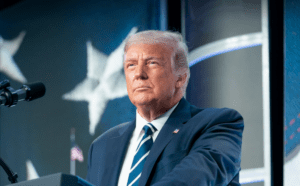Though Tax Hikes Will Be Avoided, the House Bill Misses the Bigger Picture
The tax bill prioritizes politics over economic growth, writes Daniel Bunn.
Our commentary is featured in top news outlets throughout the US and Europe, including The Wall Street Journal, Bloomberg, CNN, and Le Monde.

The tax bill prioritizes politics over economic growth, writes Daniel Bunn.

The Republican party, led by President Trump, has decided that growth is no longer a priority. This is evident in the president’s trade war, the minimal opposition among Republican members of Congress, and the seemingly endless supply of bad policy ideas that will do little to support growth.

Lawmakers should push against efforts to lift the SALT cap, and they should keep an eye toward bringing additional transparency to the tax system.

Political popularity isn’t always a reliable gauge of sound policy—and that’s certainly true of President Donald Trump’s idea to eliminate taxes on tips, bonuses, and overtime pay.

Attempting to defend Trump’s tariffs, the White House points to studies that show they raise prices, cut manufacturing output, and lead to costly retaliation.

The U.S. Constitution grants authority to Congress to “lay and collect” duties and to “regulate commerce with foreign nations.” But Congress has delegated its powers to set tariffs and negotiate trade to the president. For decades, the executive branch has used those powers to reduce barriers to trade and, sometimes, to impose tariffs in limited fashion.

Compromising on the timing and availability of expensing—or offsetting the revenue losses by worsening other parts of the tax code—would squander an opportunity to craft a fiscally responsible, pro-growth tax reform.

According to a new poll from the Tax Foundation and Public Policy Polling, more than half of taxpayers lack basic tax literacy, regardless of educational attainment, income level, or political affiliation.

If voters are being asked to charge state legislators with raising the equivalent of a doubling of the current income and sales tax, shouldn’t they get to know what the plan is first?

With war continuing in Ukraine, political instability in France and Germany, and the return of Donald Trump to the White House, this could be a year of major realignment for Europe. The tax policy mindset in Brussels should shift accordingly.

According to a new poll from the Tax Foundation and Public Policy Polling, more than half of taxpayers lack basic tax literacy, regardless of educational attainment, income level, or political affiliation.

As we prepare for the tax code’s “move,” it’s time to start cleaning out the proverbial attic of our messy system. For the sake of our economy, moves toward growth must win the day.

Tariffs are almost always the main issue connecting the tax reform debate with strategic competition with China. However, some provisions of the 2017 Tax Cuts and Jobs Act (TCJA) should get some of that attention, especially the 100 percent bonus depreciation and the research and development (R&D) amortization.

“Full expensing” may not sound like the most exciting policy, but it’s the strongest tool in our tax code to help our small businesses.

The US government’s $6.8 trillion budget is larger than the GDPs of Germany and Japan. Its roughly $2 trillion annual deficit is larger than the GDP of Mexico. And it has 441 agencies that employ more than 2.8 million civilian employees.

The new GOP Congress will have to decide how to tackle the looming expiration of 2017’s Tax Cuts and Jobs Act.

Artificial intelligence has become an increasingly salient issue for governments. In Europe, the AI question already has turned from how we can embrace it to how we can tax it.

Trump has floated a proposal to replace the US income tax system with a new system of tariffs, moving the United States back to the tax mix of the late 19th century. The plan, simply put, is a mathematical impossibility.

The long-term value of these projects to the broader public remains highly debatable.

Congress has the power to stop this trade war, and for the sake of our economy, they should.

By 2035, Social Security as we know it will largely be insolvent. If we want to fix the issue, it’s time for our parties’ leaders to reform the program so it can be around for the long run for all Americans.

Both candidates’ policies would ultimately stifle the kinds of broad economic expansion they claim to seek.

If voters are being asked to charge state legislators with raising the equivalent of a doubling of the current income and sales tax, shouldn’t they get to know what the plan is first?

As lawmakers look to renew or revise the 2017 tax cuts that expire next year, they should reconsider the need for a charitable tax deduction in the tax code.

If Vice President Kamala Harris is elected the 47th U.S. president, she would inherit a trade war started by former President Donald Trump and continued by President Joe Biden. But she’d also have the chance to end it.

To be fiscally responsible, recently proposed Pennsylvania tax cuts must be paid for in some way, either out of projected revenue growth or by offsetting reductions.

Trump’s protectionist measures and the continuation of most of them under the Biden administration already form the matrix of American trade policy after the 2024 elections.

April means Tax Day, a yearly reminder that most people don’t like our tax code. As a recent Tax Foundation poll found, people don’t understand it either. With a looming tax battle on Capitol Hill, the need for tax policy education has never been higher.

Trapped in a stalemate between raising taxes or cutting spending, France instead should consider the revenue potential of principled tax policy design.